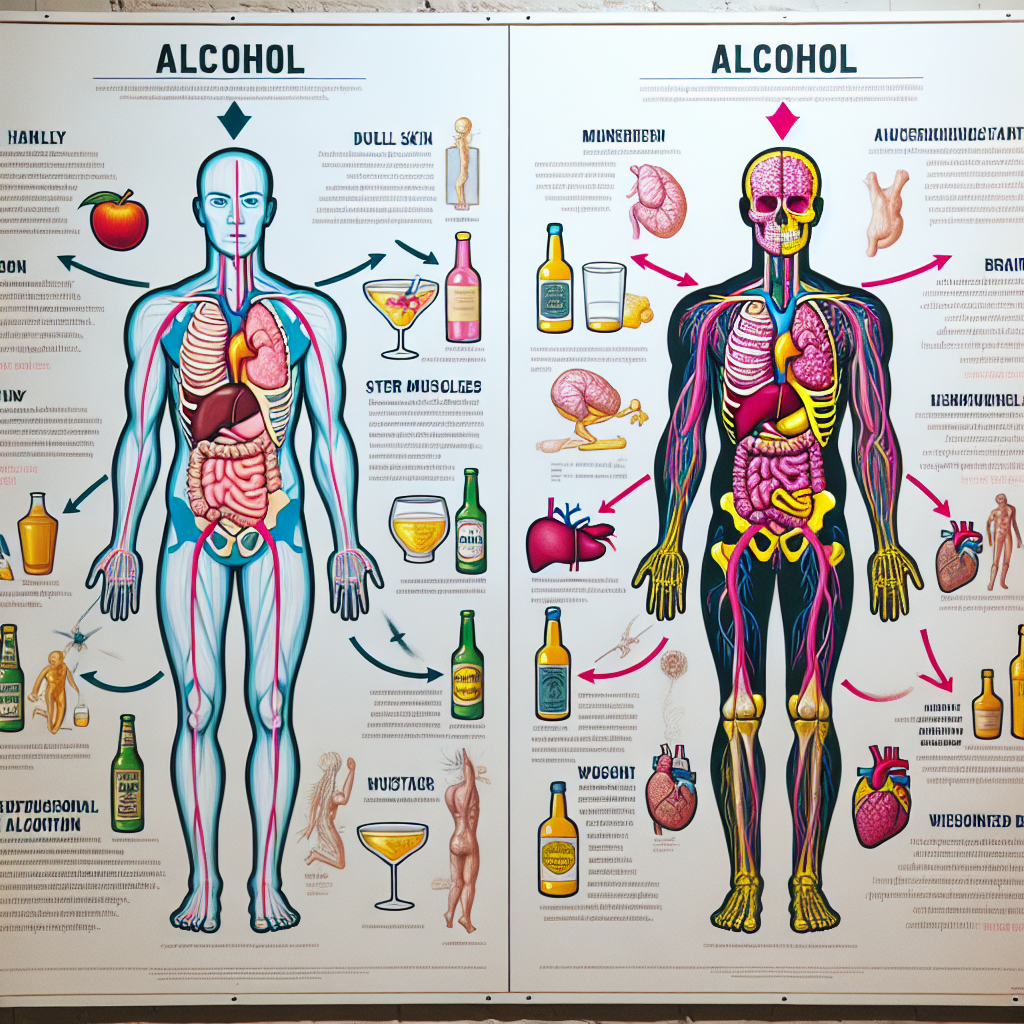-
Table of Contents

“Unmasking the Toll: How Alcoholism Ravages Physical Health”
Introduction
Alcoholism, also known as alcohol use disorder (AUD), is a chronic disease characterized by an inability to control or stop alcohol consumption despite adverse consequences. The connection between alcoholism and physical health is profound and multifaceted, impacting nearly every organ system in the body. Chronic alcohol abuse can lead to a range of serious health issues, including liver disease, cardiovascular problems, gastrointestinal disorders, neurological impairments, and weakened immune function. The liver, being the primary site for alcohol metabolism, is particularly vulnerable, with conditions such as fatty liver, hepatitis, and cirrhosis being common among heavy drinkers. Additionally, excessive alcohol consumption is linked to an increased risk of various cancers, including those of the mouth, throat, esophagus, liver, colon, and breast. Understanding the extensive physical health ramifications of alcoholism is crucial for both prevention and treatment efforts, highlighting the need for comprehensive medical and psychological interventions to address this pervasive issue.
The Impact Of Alcoholism On Cardiovascular Health
Alcoholism, a chronic disease characterized by an inability to control or stop drinking despite adverse consequences, has far-reaching effects on various aspects of physical health. One of the most significant areas impacted by alcoholism is cardiovascular health. Understanding the connection between excessive alcohol consumption and heart health can inspire individuals to make informed choices and seek help if needed.
To begin with, it is essential to recognize that moderate alcohol consumption has been associated with certain cardiovascular benefits, such as a reduced risk of coronary artery disease. However, when alcohol consumption escalates to the level of alcoholism, the negative effects on the heart and blood vessels become pronounced. Chronic heavy drinking can lead to a range of cardiovascular problems, including hypertension, cardiomyopathy, arrhythmias, and an increased risk of stroke.
Hypertension, or high blood pressure, is one of the most common cardiovascular issues linked to alcoholism. Alcohol can raise blood pressure by stimulating the release of stress hormones and causing the blood vessels to constrict. Over time, this persistent elevation in blood pressure can damage the arteries, leading to atherosclerosis, a condition characterized by the buildup of fatty deposits in the arterial walls. This, in turn, increases the risk of heart attacks and strokes.
Furthermore, alcoholism can lead to a condition known as alcoholic cardiomyopathy, where the heart muscle becomes weakened and enlarged due to the toxic effects of alcohol. This condition impairs the heart’s ability to pump blood effectively, resulting in symptoms such as shortness of breath, fatigue, and swelling in the legs and ankles. If left untreated, alcoholic cardiomyopathy can progress to heart failure, a serious and potentially life-threatening condition.
In addition to these structural changes, alcoholism can also disrupt the electrical system of the heart, leading to arrhythmias or irregular heartbeats. One of the most common arrhythmias associated with heavy drinking is atrial fibrillation, a condition where the upper chambers of the heart beat irregularly and out of sync with the lower chambers. Atrial fibrillation increases the risk of blood clots forming in the heart, which can travel to the brain and cause a stroke.
Moreover, the risk of stroke is further heightened by the fact that alcoholism can lead to the formation of blood clots and the narrowing of blood vessels. Heavy drinking can cause changes in the blood’s clotting mechanisms, making it more prone to clot formation. Additionally, the inflammation and damage to the blood vessels caused by excessive alcohol consumption can contribute to the development of ischemic strokes, where blood flow to the brain is blocked.
Despite these alarming connections between alcoholism and cardiovascular health, it is important to remember that recovery is possible. By seeking help and making positive lifestyle changes, individuals can significantly reduce their risk of alcohol-related heart problems. Treatment options such as counseling, support groups, and medical interventions can provide the necessary tools and support for overcoming alcoholism.
In conclusion, while the impact of alcoholism on cardiovascular health is profound and multifaceted, understanding these risks can serve as a powerful motivator for change. By raising awareness and encouraging individuals to seek help, we can inspire a journey towards better heart health and overall well-being.
How Alcoholism Affects The Liver And Digestive System
Alcoholism, a chronic disease characterized by an inability to control or stop drinking despite adverse consequences, has profound effects on the body, particularly the liver and digestive system. Understanding these impacts can inspire individuals to seek help and make healthier choices. The liver, a vital organ responsible for detoxifying harmful substances, metabolizing drugs, and producing essential proteins, is especially vulnerable to the ravages of excessive alcohol consumption. When alcohol is consumed, the liver prioritizes its breakdown over other metabolic processes, leading to the accumulation of fatty acids. This condition, known as fatty liver disease, is often the first stage of alcohol-related liver damage.
As alcohol consumption continues, the liver’s ability to function properly diminishes, leading to more severe conditions such as alcoholic hepatitis and cirrhosis. Alcoholic hepatitis, an inflammation of the liver, can cause symptoms like jaundice, abdominal pain, and fever. If left untreated, it can progress to cirrhosis, a condition where healthy liver tissue is replaced by scar tissue, impairing the liver’s ability to perform its essential functions. Cirrhosis is irreversible and can lead to liver failure, necessitating a liver transplant for survival. The progression from fatty liver disease to cirrhosis underscores the importance of early intervention and lifestyle changes.
In addition to the liver, the digestive system also suffers significantly from chronic alcohol abuse. Alcohol irritates the stomach lining, increasing the production of stomach acid and leading to gastritis, an inflammation of the stomach lining. This condition can cause symptoms such as nausea, vomiting, and abdominal pain. Over time, the persistent irritation and inflammation can result in the development of peptic ulcers, which are painful sores in the stomach lining or the upper part of the small intestine. These ulcers can lead to serious complications, including internal bleeding and infection.
Moreover, alcohol impairs the absorption of essential nutrients in the intestines, leading to malnutrition and deficiencies in vitamins and minerals. For instance, alcohol interferes with the absorption of vitamin B12, folic acid, and thiamine, which are crucial for maintaining healthy nerve function and producing red blood cells. Deficiencies in these nutrients can result in anemia, neurological problems, and a weakened immune system, making the body more susceptible to infections and diseases.
The pancreas, another critical component of the digestive system, is also adversely affected by alcoholism. Chronic alcohol consumption can lead to pancreatitis, an inflammation of the pancreas that disrupts its ability to produce digestive enzymes and regulate blood sugar levels. Pancreatitis can be acute or chronic, with chronic pancreatitis leading to permanent damage and increasing the risk of developing diabetes and pancreatic cancer.
Recognizing the detrimental effects of alcoholism on the liver and digestive system is a crucial step towards making positive changes. By understanding the serious health risks associated with excessive alcohol consumption, individuals can be motivated to seek help and adopt healthier lifestyles. Support from healthcare professionals, family, and friends, along with participation in support groups and treatment programs, can provide the necessary tools and encouragement to overcome alcoholism. Embracing a life free from alcohol not only improves physical health but also enhances overall well-being, paving the way for a brighter and healthier future.
Q&A
1. **Question:** How does chronic alcohol consumption affect the liver?
**Answer:** Chronic alcohol consumption can lead to liver diseases such as fatty liver, alcoholic hepatitis, and cirrhosis, which can ultimately result in liver failure.
2. **Question:** What impact does alcoholism have on the cardiovascular system?
**Answer:** Alcoholism can increase the risk of high blood pressure, cardiomyopathy, arrhythmias, and stroke, significantly impacting cardiovascular health.
Conclusion
Alcoholism has a profound and detrimental impact on physical health, affecting nearly every organ system in the body. Chronic alcohol consumption can lead to liver diseases such as cirrhosis and hepatitis, cardiovascular problems including hypertension and cardiomyopathy, and an increased risk of various cancers. Additionally, alcoholism can impair the immune system, making individuals more susceptible to infections, and can cause gastrointestinal issues like pancreatitis and gastritis. Neurological damage, including cognitive impairments and neuropathy, is also common among those with long-term alcohol dependence. Overall, the connection between alcoholism and physical health is one of significant harm, underscoring the importance of addressing and treating alcohol use disorders to prevent severe health consequences.



